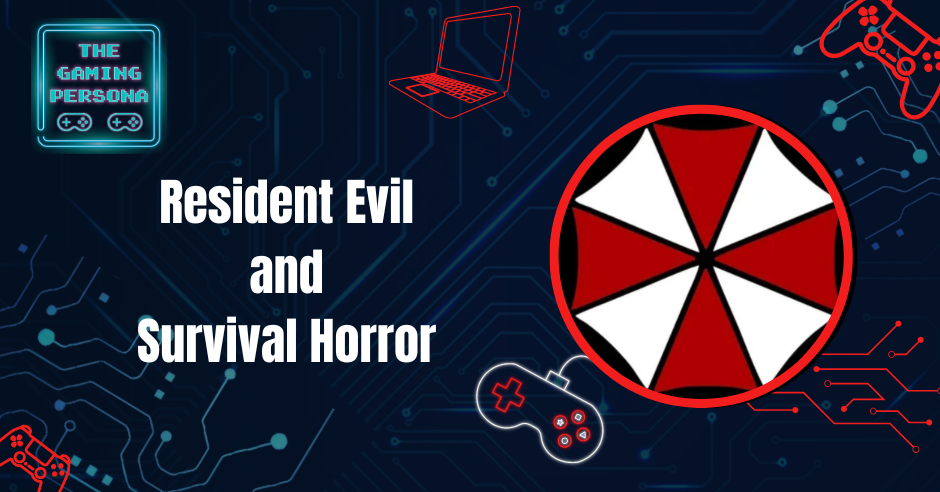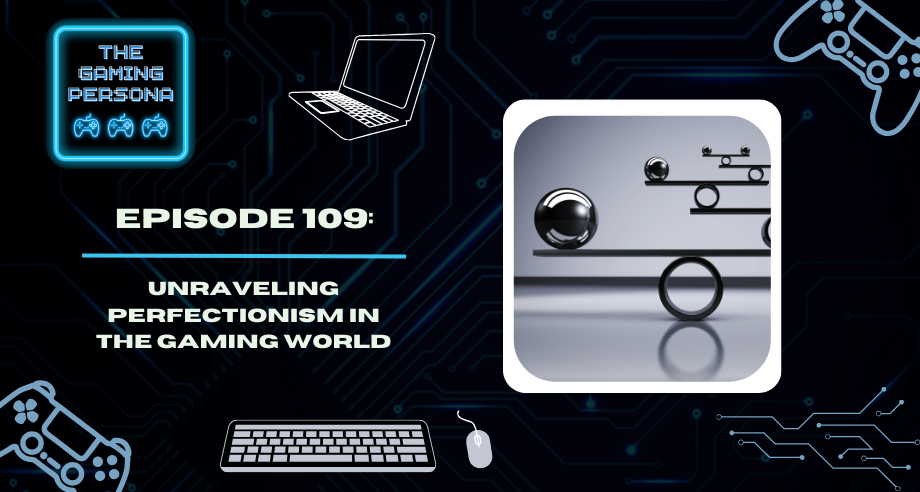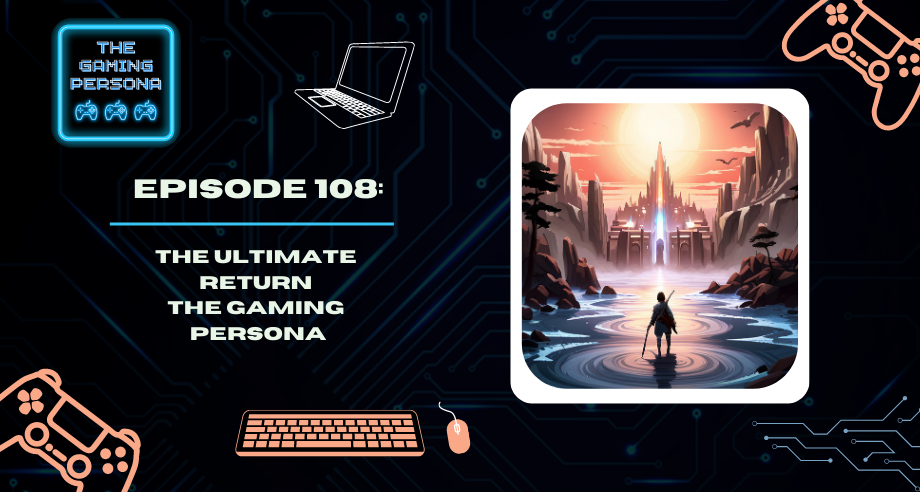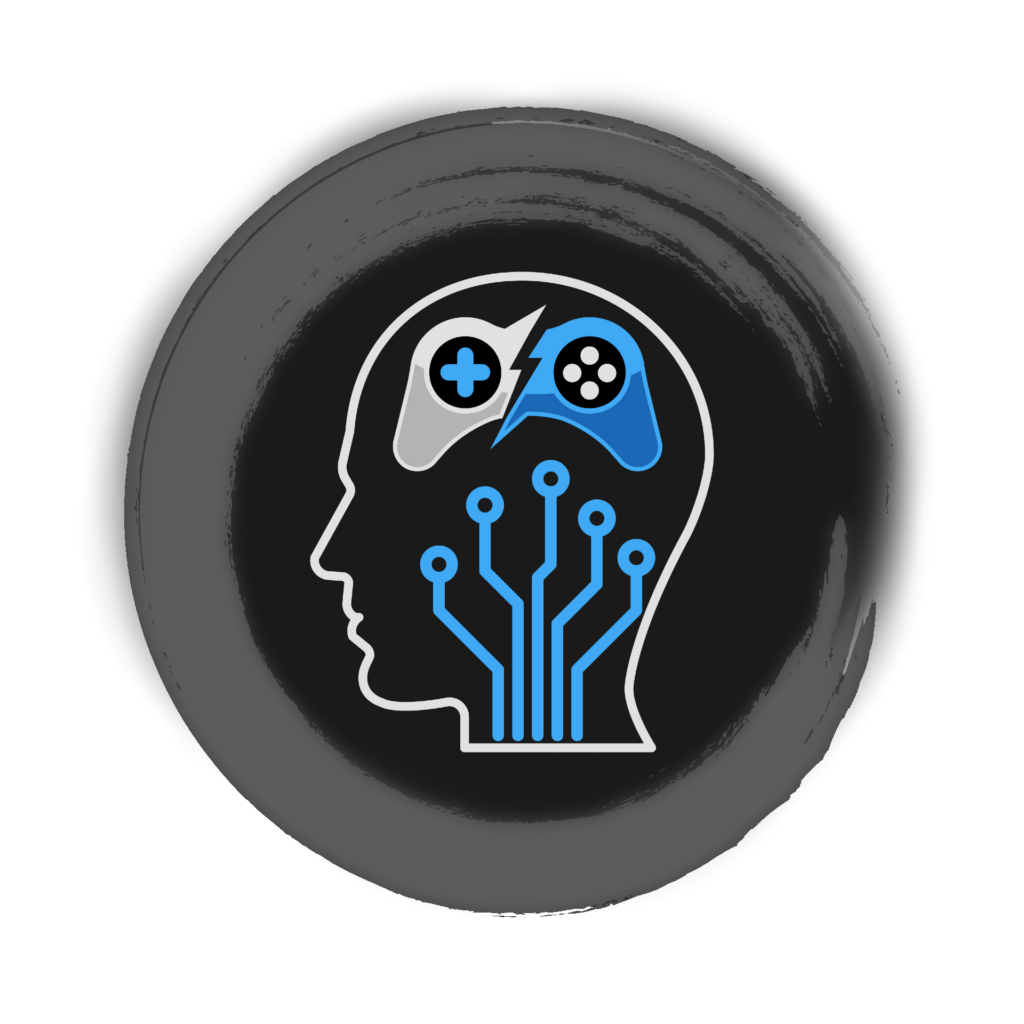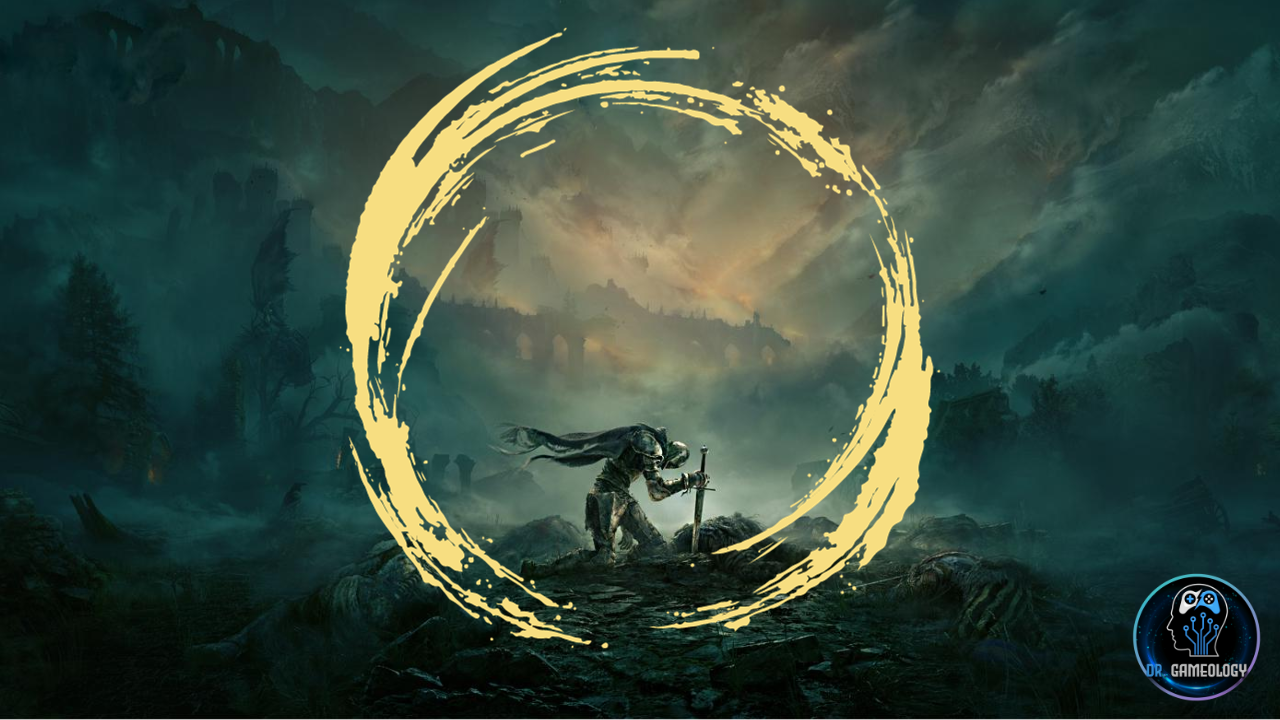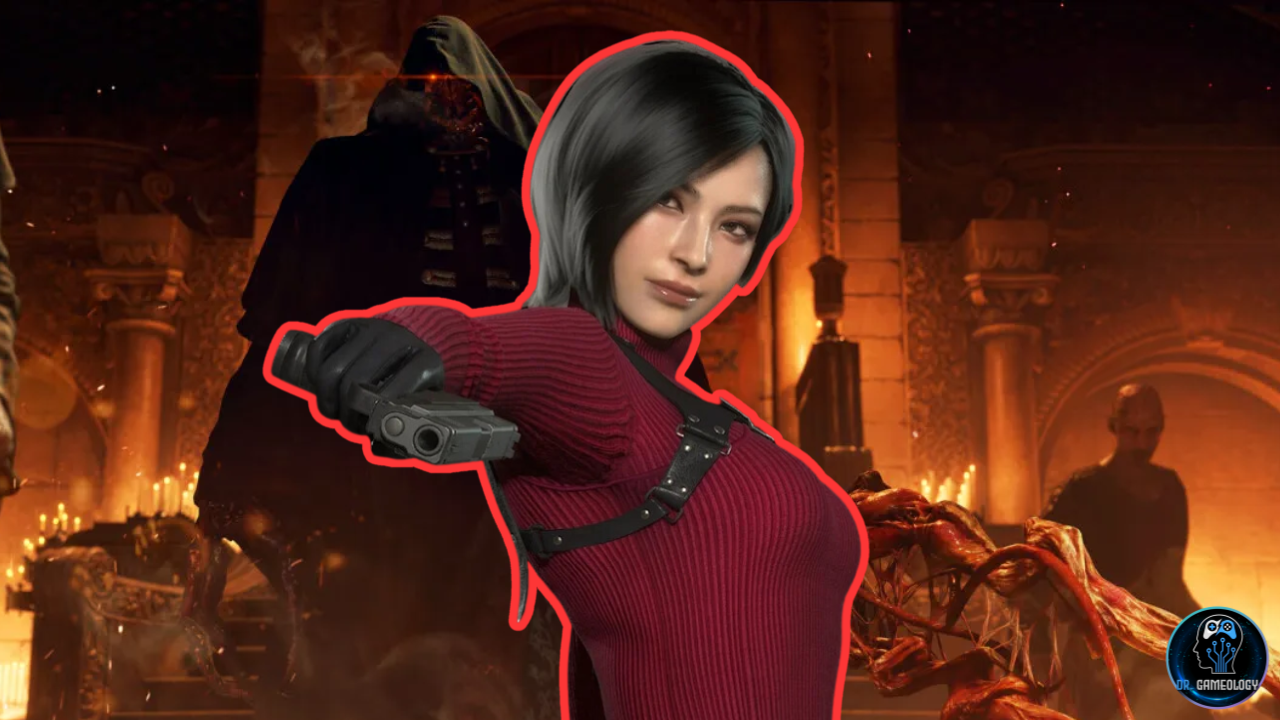Dr. Gameology reviews the Resident Evil franchise with Jenny and Gene. Research on problem solving and decision making is introduced to further the discussion of positive elements, even in games where players are running for their lives more than they are choosing to fight.
Listen to the podcast here:
Gaming Library:
Resident Evil, 13 Sentinels: Aegis Rim, Final Fantasy XIV Online, Nier: Automata, Phasmaphobia, Resident Evil 2, Resident Evil 3, Resident Evil Zero, Resident Evil 2 Remake, Fatal Frame, Resident Evil 5, Bioshock, Half-Life 2, Tetris, Dr. Mario, Medal of Honor, Everquest, World of Warcraft, Remission, Danganronpa, Assassin’s Creed: Unity, God of War (PS2), God of War (PS4)
What are we talking about from the world of video games today?
We are going to be talking about the psychological experiences of playing games in the Resident Evil franchise.
Enter the survival horror. I might have been waiting 75 episodes to say that with Gusto, but oh my gosh, I can’t wait.
Ordinary World
Before we get started on that topic, let’s head into our Ordinary World where we share everyday life through our games. So, whichever of you wants to go first, how was your week in the world of gaming?
I was mostly bedridden, and I ended up blazing through all of 13 Sentinels: Aegis Rim and got the platinum trophy.
Wow, your sickness gave you a platinum trophy?
Yeah, basically.
So all last week’s episode, Jenny and I spent an hour talking about how I needed to earn a doctorate in order to get a platinum trophy. And for you, all you have to do is get sick.
Yeah.
Great. So how long did it take you to earn that?
I don’t remember. It’s about a 40-hour game. I would say more because I went back and did a whole lot of… there’s multiple difficulties on the battle stages, and I went back and sort of restarted on intense difficulty to get the real experience instead of just gone through it on normal.
You know, Gene, you have a talent for beating games on high difficulties, and one of the things that my self-esteem had some doubt to it was a couple years ago, there was a Resident Evil game that came out, and you beat the hardest difficulty based on your trophy list before you cleared the Easy and Normal difficulties, and I was still working on the Easy difficulty. I just felt really bad for myself.
Well see, I tend to approach games on the highest difficulty first, like the highest available first because that way you get the maximum amount of adversity. If you know what’s coming from playing a previous difficulty first, you know, how to plan for it. I like the surprise.
Jenny, are you hearing what he is telling us to play games like?
I don’t know about that. It’s, this is a video game related. But I went kayaking yesterday, and we were practicing how to balance on the kayaks and get in and out of the kayak if it flipped over, and my boyfriend was like, “Oh, we need to practice this in the ocean.” I was like, “Well, I would much rather practice this in the spring where it’s like calm waters before I get to the ocean.” So yeah, that’s not how I play video games at all.
Gene is like, “I should practice this on Niagara Falls.” In education, we have this concept called scaffolding where you build people’s ability up by using lower difficulty challenges as the learning environment and then pushing them upwards. And Gene, however you decided to form your most basic connections with video games, you are more of a cascading downward / fully confident in your skill that you develop through sheer pain and conviction.
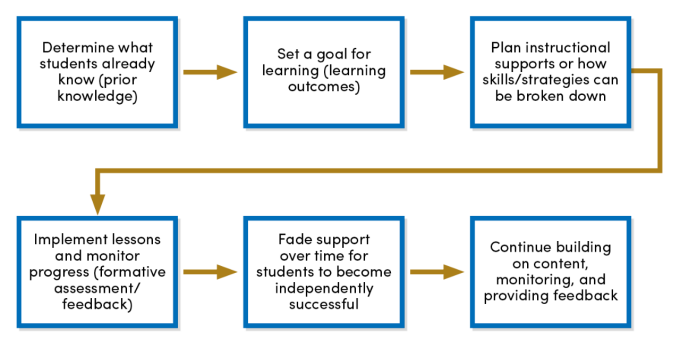
That sounds about right. Yeah.
Okay. I have something amazing to share in my Ordinary World, and I am about to give a whole lot of strife to my cohost that’s been on the most episodes with me! Jenny, do you even know what I’m about to tell you?
No.
I defeated the RNG goddess at a shirt challenge in the Nier raids. Yeah, that’s it. I got the shirt. You didn’t. And now who’s the meme? Ha, ha, ha, ha.
Okay, well, you didn’t get it on the first try.
You didn’t get it on the second try Jenny, and that’s the point.
Yeah, yeah. But I honestly wasn’t like …. I didn’t set up the night for us to go get me the shirt. I was more focused on getting you the shirt. So you know, “you’re welcome.”
Okay. Thank you, RNG goddess for blessing me with your gift.
No problem.
I still haven’t been able to set up my glamour for that. I do want to do that on a night where I’m streaming Final Fantasy 14. The raid ended so late at night that I forgot to equip the outfit and dye the shirt and make it into my color scheme and figure out what pants I’m going to put with it. These are really important decisions. So Psych Squad, next time I’m on Twitch with Final Fantasy 14 Online, I promise we will equip the samurai outfit. That will be Kiriaye’s go to sword-wielding murder suit moving forward.
So yeah, I didn’t get a shirt, but I did get a new skirt that I absolutely love. After we played, I ended up looking up on Eorzea collection some different inspiration for outfits. So I’m looking forward to pairing that with something else.
That’s awesome. So we both kind of won on Sunday night?
Yeah.
I would like to say though, that the audio grams that I put out on social media to promote our episodes, when you and I are going at it about your RNG abilities, those get lots of traction. People think it’s hilarious, so I thought I would lean into it. I don’t know. Was that too mean, my whole “I beat the RNG goddess?”
Noooo! No, of course not.
The Call To Adventure
Oh, oh, okay. Well, this is great. So we all did our ordinary world stuff. Let’s answer our Call to Adventure. This is where we get into our topic for the week. So this week, Netflix released its Resident Evil show. So show of hands, how many people on The Gaming Persona have watched it so far? And for people who are listening to this because you can’t watch it, two of us have raised our hands.
Yes, when one of our hands is planted firmly by her side.
Okay, now Resident Evil is one of the most important game franchises for me as the person that became Dr. Gameology. I’ve already shared a little bit about how gene was the friend that introduced me to this franchise. So I want to just do a quick circle around the room and talk about what we know about horror games. It doesn’t have to be Resident Evil, but just some of our experiences interacting with games that made us feel the sensation of fear and why that’s interesting to us.
So as most of you know, I don’t like horror games. I don’t like horror at all. But I mean, I will watch a horror movie from time to time as long as I can watch cartoons or something light-hearted afterwards. It’s not something that I enjoy. I get really anxious when I’m watching scary movies. The worst type of scary movie for me are zombie movies. I have an intense fear of apocalyptic situations. Specifically zombies. I don’t know why, but they their noises are gross. I don’t like them. So yeah, that’s why I don’t play Resident Evil and won’t be playing or watching it. But I have played some scary games. Well, I say some I played one scary game before. And I actually was really, really into this game. I played Phasmaphobia for quite a while last year, and I’m pretty sure the year before that, too. It’s a really fun game. It is terrifying. It’s a type of game – I don’t know, Gene, if you’re… Are you familiar with Phasmaphobia?
Yeah, well, I mean, Phasmaphobia is definitely scarier than all the zombie games.
Yeah, it definitely is!
I know, I know. I don’t know what it is. But I have not and I can’t, I can’t. Um,
What is it about the zombies that makes them scarier than all the frequent jump scare moments in a game like Phasmaphobia?
Well, I realized at the start of the pandemic, that …
Oh, by the way, wait, Jenny, I need to pause you there. Does everyone here realize that the irony is not lost on us that the COVID 19 pandemic is really just real-life practice for how not to doom Planet Earth in the event of the Raccoon City outbreak?
I don’t know. I don’t know what the Raccoon City outbreak is. But it sounds…
Oh, you will know. Just give us 30 more minutes.
Well, anyway, at the beginning of the pandemic, so it was basically my worst nightmare coming to life, like in real life. There is something about a pandemic type situation where you’re isolated, and you can’t get to your family and friends, and you’re worried about getting infected, and and it feels like the end of the world as you know it. That has always really terrified me. And the zombie part of it, I honestly, I just don’t like the way they look. They’re just kind of gross looking. So I realized that it wasn’t a fear of “zombie zombies.” It was moreso a fear of an epidemic or an apocalypse type situation.
All right. So Gene, what do you find appealing about the Resident Evil franchise and their specific brand of survival horror?
So I think that stands out to me in terms of, well, any survival horror, is that there’s a lot of constant decision making. A lot of picking of the choices between safety and danger. Almost all of the Resident Evil games have a limited inventory system. So between one safe zone to our next, you have to make the decision of how many bullets can I carry? How many healing items can I carry? And will I get there with what I have, while leaving enough space, to also pick up the puzzle related items and other things along the way? I think that’s the most appealing part. That’s also what brings out the terror. It’s like well, I brought three puzzle items, an herb and one gun with no bullets. Well, I hope the bullets in my gun are enough to take out however many enemies are between me and the next person.
That’s really excellent point, Gene. One of the things that is so different about these games is that limited ability to fight. Resident Evil, back when I played it the first time, I was playing the remake on the Nintendo Wii, that was the first game ever where you see enemies in front of you. You know that if you fight them, you’re going to be wasting resources. So instead of defeating your enemies, your goal is to just get past them with as little damage, zero damage, if possible, as possible. I think that the goal of surviving instead of conquering is a really neat psychological shift for a video game to make you grasp with.
Yes. And even the games that don’t have a limited inventory, it’s still generally, that same choice concept still exists because even when I don’t have a maximum inventory, I still have to decide what can I spend on that enemy? Or can I just leave them and move on?
Yeah, also the final bosses, I remember one specific playthrough for the Resident Evil 2 Remake on PS4. I brought so many things with me to the end, that I had to just dump my ammo. So I could pick up the battery to plug into the subway terminal. And in this game, you can’t just put items that you do not choose to use on the ground, and then go plug in the battery and then pick up your ammunition. You basically are dissolving the ammunition into the forces of existence. You will never fire those bullets.
Ironically, that’s one of the things that made me mad, like Resident Evil Zero, because it does feature a system where you just throw things on the ground, and we’ll come back for it later. And not simply because that makes it quote-unquote “easier,” but it becomes a chore actually, like, “oh, I have to remember where I put things.”
Also, both of you have done escape rooms with me, and I would just like to say that this particular franchise, and this way of creating video game challenges is possibly the closest thing to a video game being an escape room. That you could probably say Resident Evil is the original escape room game.
For definitely for Resident Evil 1, 2, and 3, I would definitely agree with those. Unlike the later games, you’re trapped in a very small location, and it’s all about trying to leave…
… in a residence, you might say!
yes, in a residence.
Yeah, the first game takes place in a mansion. The second game takes place in a police station. And the third one takes place in the city, but you do have segments of the game where you are locked in a hospital or that same police station at different parts in the timeline. So there are just multiple residences that Jill Valentine and Carlos Oliviera will be running through during that challenge.
The Road of Trials
And speaking of challenges, let’s do our Road of Trials where we face those challenges and discover our strengths. So I want to talk about the early Resident Evil games and what makes them unique. Then if we have time, in this segment, I would love to talk about the transformations to the franchise, and what it’s been like to decide what we think about survival horror now compared to where it was 20 years ago. I think if we can fit all of that into this segment, it will be a triumph. So I’ve already talked a little bit about having to drop ammo, and about the escape room dynamic. So Gene, what do you think it is about this franchise that makes it a unique way of telling a scary story?
So one thing is, to my knowledge, at least in my personal gaming experience, the narrative of these games, these early games are almost told exclusively through little notes and letters and journals that you find. There’s very little direct dialogue. So it’s got this lived in experience where yes, you’re trying to escape the zombies and escape the mansion. But you are uncovering why you are stuck in this mansion begin with just by figuring out why other people are dead.
Oh my gosh, Jenny, do you remember the several episodes including the one where we had Wes talking about Elden ring and I went on this whole thing about environmental storytelling.
Yeah.
I think I fell in love with that style of game because of Resident Evil.
Yeah, I would probably say, yeah, that is, that is the first time I’d experienced that. And I’ve loved it ever since. Yeah, I would agree with that.
That’s so weird because you have these camera angles in those early games. The camera is not behind your shoulders, like in a third person shooter. The camera is mounted on a wall in the room, and you walk into the room as the character and your control stick controls the directional movement of that character, like a tank would be controlled. So if I’m holding up on the control stick, my character will move forward for them, and I’m looking at the room as if I’m mounted on the wall. So forward for me, is not forward for my character, and I actually was wondering about this, if we have first person shooters, and we have third person shooters. What would a second person shooter be in … is this that?
I mean, debatably, I mean, these first Resident Evil games, I couldn’t really qualify them as shooters because you don’t really need shooting ability to hit the enemies with the auto aim, and the fact that it’s not really about skill in terms of like, “can I hook them in the head?” In those first games, it was kind of like, except for when you’re directly next to them and you aim up at a 45 degree angle to shoot them in the head.
That’s true. But I just was wondering, as far as perspective, it’s very hard to tell a story in second person. And I was just wondering if the camera being mounted to the wall makes us the residents in a way?
Yeah, that is debatably true. So this is a different game, Fatal Frame. It’s another horror game series, there is a segment in Fatal Frame 5 (that’s the moment actually most recently), where everyone is in a building. It’s like a home that stacked on top of an antique store. The person lives in the like, rooms behind the antique store that she owns. The thing is, with that one, with that situation, is that at some point, ghosts invade the building. There are people sleeping in different rooms who can’t defend themselves. You’re just flipping through security cameras. And like, as you see these people get assaulted by ghosts, you have to swap out of the camera mode and make your character run to go save them. I feel like, yeah, that that camera interaction does kind of make it a second person experience.
So what you’re saying is that if we make a horror franchise, and the main apparatus for interacting with the world is a camera, then Jenny will play it.
Well that you do that in Phasmaphobia. You set up video cameras throughout the house, to try and find like little orbs and things like that. That’s how you can determine where the ghost is and what kind of ghost it is. But you can actually see players playing in like real time in whatever rooms that you’re pointing the cameras to. So basically, I spent a lot of time in the van watching the cameras.
I think it’s interesting how we’re seeing a thematic element, though, that cameras are a way to peer into the supernatural world.
Oh, yeah, definitely.
I wonder how many mythological sources look at the use of glass or lenses that way? I know there are many games where you’ll have a mirror or a Lens of Truth. And so in modern times, you have cameras and things like that.
Or even water.
Very true. Yes, water is also something that’s used as a conduit between realms often. But we are getting away from the very realistic and horrific realities of zombie horror. So…
Oh, no.
Oh no. Another thing that I think is really interesting about those early games is usually in video games, when you defeat your opponent, that is a big accomplishment that you should be proud of. The first Resident Evil game, however, when you kill a zombie, it’s “dead-dead” body continues to lay there, and at a random time through that hallway, which can’t be predicted, it will wake up as a crimson head zombie, which is faster and does more damage. So, by deciding to defeat an enemy early in the game instead of run past it, you are making your final journeys through those hallways much harder. That is another example of serious decision making as far as your strategy as the player.
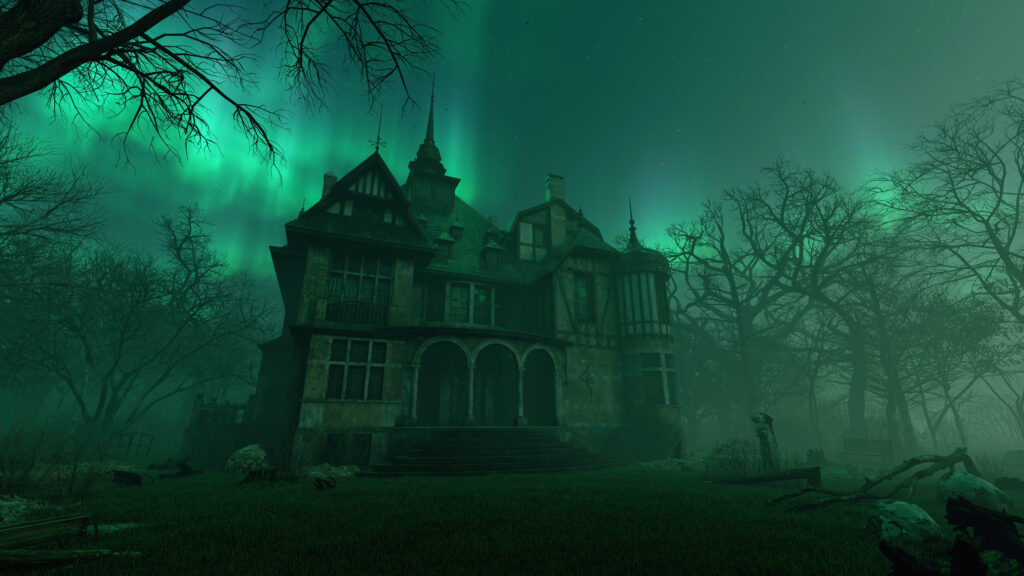
Yes. And what’s another interesting aspect is that well, I think every Resident Evil game nowadays? Well, there’s probably some exceptions – But each game has a time-based accomplishment system. You unlock things by beating it within a certain number of hours. So when you do make the decision to kill a guy, and maybe come back to a harder version of it later, it’s also a factor of like – Oh, if you understand that is a part of a franchise – it’s “What kind of time am I devoting to resolving this situation?” because with the original game, you have the option of also carrying around oil and a lighter, and torching these bodies so that they can’t come back. But that’s time that you have to devote to running back and forth between your storage carrying these items that are otherwise useless.
That’s very true. Also the entire time, that’s two inventory slots to do something that, if you just play well, this is not that big of a problem. The other thing I want to talk about are the characters, and the multiple endings. I am a sucker for multiple endings in video games, and in that first Resident Evil game, you have a choice to play as Chris Redfield, or Jill Valentine. Both of those characters come equipped with a supporting cast character that shows up in scenes with them. So Chris will be accompanied by Rebecca Chambers, who is one of the key protagonists from Resident Evil Zero. She is actually in the mansion, and the members of S.T.A.R.S. have been dispatched to go retrieve her safely, because her entire squad is M.I.A.. Jill Valentine is accompanied by Barry – “I have this.” I don’t remember his last name.
Burton.
Yes, he’s a wonderful character. And then also there’s Albert Wesker, who is the leader of S.T.A.R.S., and so much more. In fact, Albert Wesker is the first character that I ever cost played at Megacon.
That’s pretty cool!
So that’s some fun Dr. Gameology trivia right there. So needless to say, when Gene and I would play Mercenaries in Resident Evil 5 and do the duo tag team PvP, I would usually be Wesker because that was my favorite character to play as even though he’s not a good guy. So I think that these characters really help create a story that’s memorable. And not all of them have to make it out alive in the first game. So Gene, would you like to review some of how that works?
Yeah, there’s various decisions in the game that determine the fate of certain people. Well, even besides the characters you just mentioned, there are a few additional characters. So for instance, you encountered Richard, I believe his name. So part of the team for that Rebecca is on and he gets bitten by a giant snake at some point. And you have the option of looking for a way to cure him of his venom or not. Also, there’s a time factor of you, you know, you have to get the venom to him before he dies. But whether or not you save him affects the second half of the story. Because if he’s not dead there, he comes back and helps you out later. There are other decisions like that, that will cause Barry or Rebecca to face various hardships. Barry especially, because you can just not help him, you can be a jerk back to him, and just let him die.
That’s true. Yeah, a lot of the variations in Jill’s ending stem from what you think is a good idea with Barry, and the battle with Lisa, who is a tragic, Umbrella Corporation science experiment – Who you have to fight, of course. At the end of the day, you have to rescue the other character that you did not choose to be. And you have to have a showdown with the main experiment of the T-virus, which is called . . . what is it called?
The Tyrant?
Yes, the Tyrant! The way that the game ends is so iconic, that you end up blowing up the mansion. There are so many different variations on what that means. Is there actually a way for the game to end where you do not get out?
Yes, there is. The end, there’s a timer. There’s a countdown timer, you can just lollygag. And then . . . just die.
Does that count as an ending?
Yes, the mansion explodes. You even get a cutscene of the mansion exploding? And then that’s about it.
Yeah. So this is why it’s important to take your deadlines seriously, everyone. I do want to include in the segment, Gene, since you and I have both watched the Netflix show, what were some of the things that you thought of as a fan of the game franchise? Just that we have that in our talk today.
So I think the most the strongest point of the show overall, is that the monster designs were very faithful to the source material. The Lickers behave like Lickers. The Cerberus dogs behave like the Cerberus dogs. The only real deviation was the zombies, the zombies got a lot faster compared to the originals.
Yes, that’s probably cinematic interpretation, though, to make the show interesting. I really did like the chase scene with the spider though, because it ended with a puzzle solution instead of an ammunition solution. And that’s something that I really do we equate with lots of Resident Evil games is usually you can have a ton of bullets and win that way. But there usually is a smart way to win. And that’s what the game really is pushing you to figure out.
Something I really equate with Resident Evil games is usually you can have a ton of bullets and win that way. There usually is also a smart way to win. That's what the game really is pushing you to figure out. Share on XYes. And that spider scene is also a very, it’s very much an imitation of the alligator chase scene in Resident Evil 2? Well, the remake.
That’s very true. A lot of these games have been remade as well. So right now we’re waiting for the Resident Evil 4 Remake, which will come out next year. It just seems like the canon of the story is never modified by these remakes, but it just updates the gameplay style so that modern audiences can appreciate what happened in those stories. I think that’s why I’m such a fan of the franchise right now. The Resident Evil 2 and 3 remakes gave us that extra time to appreciate our time playing as Leon and Claire, and then Jill. And any game where I have gotten to play as Jill has tended to be one of my favorite games. I just think she’s such a good protagonist and even saving her in Resident Evil 5. Even though you don’t play as her in that game, really made the story of the battle between Chris and Wesker so much more epic. I know, I just jumped four games on you, Gene, but the story is so good (Sometimes it’s ridiculous) but that’s also a sign that it’s so good.
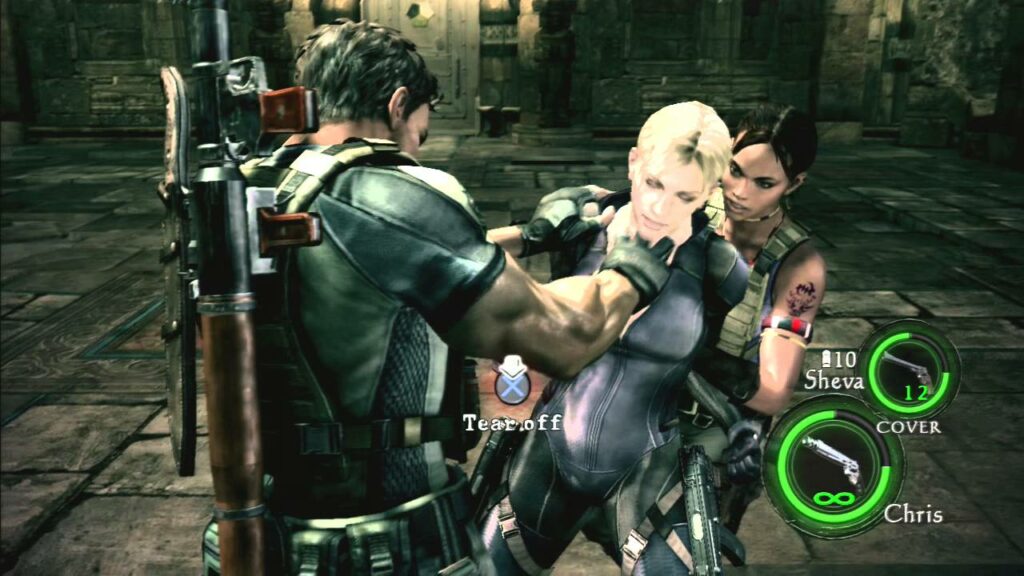
So yeah. That battle against mind control Jill is still a highlight of the series to me. When we Co-oped it on the highest difficulty, she was unstoppable monster.
She’s so mean. So Jenny, we’re, we’re going to tell you about this fight. So Resident Evil 5 is a solo or Co-Op game, because there’s two characters that do the entire game together. Chris Redfield; He’s the returning character from the original game, and then there’s Sheva Alomar. And she is actually from the fictitious country in Africa that you are investigating to try to find Chris’s lost partner, Jill, if I remember correctly. So the two of them are going through all these levels together, you go inside this ancient temple, of course. And Jill is your enemy with this crest on her chest. It’s like a Ruby kind of jewel that is mind controlling her to make her an evil jerk. You have to shoot that jewel, and then run up to her and try to grab it, then button mash on your controller to pull it off of her. The problem with that is if you miss then you just shot Jill, and you lose the game because you just killed your friend. The cool thing about this fight is after you defeat Jill you fight Wesker for the first time in the game, and realize that he has crazy mutant powers. That’s a fun fight as well, because if you shoot bullets at him, he dodges then “Matrix-style” runs up and punches your head off. So you have to ambush him and surprise him. The whole fight sequence is just one of the coolest video game challenges I think I’ve ever done.
Yeah, on the highest difficulty, everything Jill does will instant kill you. You have to do the whole “grab the jewel and button mash to pull it off her” several times before it comes out. Every time you do it, she’ll struggle and then try to elbow you in the face. That elbow is super fast and will kill you.
Wow.
Also, we had to develop a complete teamwork dynamic to take her down. I was the sniper if I remember. And Gene’s job was to go in up close and not get that elbow to the face.
Yeah, pretty much.
Yeah. Ah, listen to our old video game man stories. So I think it’s time for the Ascent so we can elevate the topic.
The Ascent
Now, Jenny, this is going to be a really cool segment because the article I found that talks about the positive psychological qualities of Resident Evil and other violent video games was actually written by one of the friends for our show, Chris Ferguson, who is a professor at Stetson, and was on both of our panels at fan conventions earlier this year.
Yeah. He’s a cool guy!
So this article was published in Review of General Psychology back in 2010. So I remember originally reading this when I was trying to decide “What game could I do research on as a doc student?” And so of course, I went down that train of thought for Resident Evil and I decided Star Wars: The Old Republic. So now, not sure what was wrong with me back then, hah? Just kidding. We love our Old Republic. Yeah. I really do love Resident Evil though.
And dark timeline, if you had chosen Resident Evil, I don’t know if our friendship birth would have happened because I would not play Resident Evil with you.
I think that we still would have had to survive the real Resident Evil horror together, regardless of playing video games.
So, there are actually three categories of how violent video games create pro-social opportunity for change for people. So one of the things – I don’t want to pretend that I can speak for Dr. Ferguson – But one of the things that I believe that we see pretty eye to eye on is this idea that the negative conversation about video games influencing young minds is sensationalist propaganda. Really, if we look at what video games actually do, there are qualities about video games that can do really great things for people. I really hope sometime soon we can have him on the show, so that we can just have this conversation, I think that would be amazing.
I want to just throw these three areas at all of you and just comb through your video game experiences and talk about if you’ve noticed some of these things in your growth as a person that’s also a game player. So, in video games, we are often tested on our visuospatial cognition, all right, so our ability to create mental maps of things and recognize where we are in that virtual space. Are there any situations where you’ve noticed video games teaching you how to do that successfully?
I feel like this happens all the time. When I’m playing a raid, like doing the Nier raids, having to do my rotation and beat the boss and beat the ads and make sure I don’t step in the wrong place and look out for the laser and all of these things . . . I’m constantly scanning and processing and selecting what I’m doing. And yeah, this is this is always going on for me.
What about you Gene?
Sure. Well, the example I talked about earlier 13 Sentinels. So the battles in that game are somewhat like a tower defense game. If people are familiar with that genre. You know, you’re on a map, and enemies rushing at you trying to blow up your base, so to speak. You have up to six characters, you can deploy any way you want. They are in giant robots with different weapons that have different cooldowns and energy costs. The key is to plan which character and which robot uses what ability when to kill the enemies before they blow you up? And yeah, it’s a it’s a lot of just like, if you were, I don’t know, a manager in real life. It’s about knowing the strengths, weaknesses, and capabilities of your team. And yeah, this deciding who can do what, at what time.
I would even have to tap into that ability when I would place clients from the state hotline for gambling issues with different counselors. Sometimes you’re limited by geographical distances, but if you’re talking about telehealth, it’s really about, when I talked to this person and got a feel for what they’re up against, who would I put them with to give them the best opportunity to succeed? And that does kind of place the counselors in my treatment program as if they are assets to my team in a game like the one you’re describing Gene.
For me, I think that the visuospatial element comes from the layout of the mansion in a game like Resident Evil, it is a map and it is architecturally consistent, in most ways. This means if you’re on the second floor, there is a room that is underneath you on the first floor, and sometimes there are things you need to do that use that knowledge to solve a puzzle. They aren’t usually doing too bad of a video game developer trick, where rooms are bigger than they should be, and the building actually wouldn’t work. I have found in Resident Evil that the buildings actually do work from a spatial conceptualization. What that means is, I can have a map in my head and begin to understand if I have my character walk forward, where are they in the context of the building? It’s not an imaginary virtual space that is impossible. It’s an imaginative virtual space that is possible. It follows the same logic of a map that you could draw for a real-world location. Research, like what is reviewed in this article, identifies that players who have developed this skill (And these skills are are also tested on things like intelligence tests), but you can develop these skills more strongly and more consistently, playing games like Bioshock, and Half-Life 2 (And by extension, Resident Evil as well), then you would playing non-violent games like Tetris, where there is a spatial awareness, but you’re not interacting with a character in a setting / environment / space. So it’s a hypothetical spatial awareness in a game like Tetris or Dr. Mario or … Well, I don’t know, could you say Dr. Mario is violent? You are destroying germs. We need to table that idea until context number three.
So context number two is social involvement, which in the 1980s, when video games started to really get into households at more rapid / frequent paces, video games were looked at as “these are keeping my child inside. My child doesn’t know how to make friends anymore!” But then the internet really undid a lot of that. And then starting with Medal of Honor and EverQuest, and then World of Warcraft, games like that became huge, all within a three-to-five-year span of each other. So what are some games where you have learned some really valuable social interactive lessons by playing them?
The layout of the mansion in Resident Evil is a map that is architecturally consistent, in most ways. The map in my head begins to understand when I have my character walk forward, where are they in the context of the building. Share on XWell, I mean, yeah, World of Warcraft was a big game for me early on, in the high school days when that first was first coming out. I basically reinforced the bonds with my friends that were also playing the game in high school.
[sob] Gene never asked me to play this with him in high school . . .
I don’t think we were friends of that level yet in high school because you we were friends at a very weird point in high school, and then we stopped being friends. And then we became friends and after high school.
I don’t remember stopping being your friend in high school Gene. Okay, so you heard it here. We were not “World of Warcraft level friends” in high school.
No, there wasn’t. Well, I mean, I just we’re being stopped being friends, but there was definitely a point in that timeframe where we didn’t really talk.
Oh, so sad. Well, maybe if we played video games together, we would have had higher social involvement like our episode is talking about?
Yeah.
Yeah, like the game that comes to mind for me is the first game that I played with both of you, Star Wars: Old Republic. Another MMO that which is basically built for, at least for me, built for a social type of gameplay. Yeah, that’s how we met Gene.
Yeah.
Yep, killing bosses together is good for building friendships.
Yeah, that was the first time I was part of like, a team that would meet every week and try to accomplish a goal and it was kind of fun.
Yeah, I wish I played The Old Republic at a better time in my life because I know I had to bail on you guys. Not too long. afterwards.
I seriously don’t remember it that way. We beat all the bosses on story mode, and we did not have the roster to go after hard mode correctly. You really do need tanks that eat and breathe SWTOR in order to have a shot in that game. The difficulty escalation from each difficulty level is daunting.
Yeah.
Where other games go from easy to normal in very forgiving ways.
It was still fun, because there was a time where even the easy version of some of the raids were kind of hard. It was fun progressing through that.
Yeah, the first time that we were able to beat Revan, and the first time we were able to beat Master Blaster are some of my favorite raiding moments still, even if they weren’t on the highest difficulty. It’s amazing to break through.
And that’s fun that the short amount of time I did play the game, it was pretty fun.
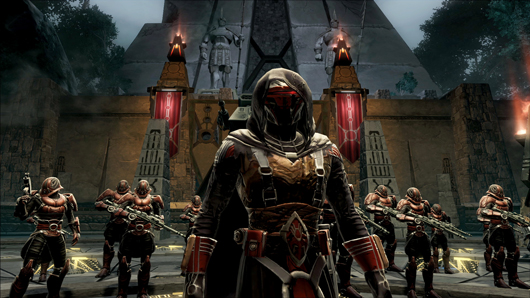
The last context is education. So one of the examples is a 2006 game called Remission, where a microscopic female robot is put inside a cancer patient’s body and goes around killing the cancer cells. It’s sort of an educational way to learn about the body and what cancer does, but it’s a fictional action shooter kind of adventure way of delivering that information. So the question becomes, are video games potentially a more efficient way to deliver educational knowledge to people?
I think so. Yeah,
I definitely think certain concepts are definitely. So I Daniel you’ve been going through Danganronpa. That game series brings up the concept of things like the trolley problem, the prisoner’s dilemma, things like that in a very real and direct way.
All the psychopath tests. But also, there’s a anecdotal story I’ve seen online a few times over the years where a school’s tour group got lost in France. This kid just started guiding the rest of his peers and the teacher through these alleyways to get to the landmark that they were trying to find, without a map. Everyone was puzzled at how he knew where he was going. They did arrive at the Cathedral or the monument or whatever they were going to, and it’s because of Assassin’s Creed Unity that he knew where he was in that city. All the time spent memorizing those streets in Assassin’s Creed, and then just having to realize that it’s a couple of 100 years later, but the layout is roughly the same.
That’s so cool.
And for me, I know that my knowledge of mythology is greatly enhanced by the ability to tell where God of War uses mythology to create a situation and then where it departs for me to play that situation. So Kratos is not actual Greek mythology. But the people he’s killing is, and their powers as bosses at the end of the stage come directly from what people held them up to in their ability sets as part of the Greek pantheon of gods. Now the Norse Mythology is being explored by Kratos as well. That’s one where I don’t think I would know anything beyond the Marvel Thor movies without Kratos. So I think, ultimately, it’s great for video games to give us an opportunity to interact with ideas, and to expand what it is we know.
Our knowledge of mythology is greatly enhanced by the ability to tell where games like God of War use it to create a situation and then where it departs for us to play that situation. Share on X
The Return
So let’s go on The Return where we go back to our daily lives and take our next step forward. So Gene and Jenny, we’ve talked about the early Resident Evils. We’ve talked about the teamwork in the later Resident Evils, and we’ve talked about ways that violent and scary video games actually help our brains do things better. So what do you think you’ll take with you into the rest of our week?
Oh, I definitely won’t be watching the new show on Netflix.
Oh, come on. It’s so much fun.
Hey, what’s actually funny is I have plans later on this evening to watch a horror movie with my boyfriend.
Maybe you should watch the Resident Evil show instead. Change of plans!
So I think for Resident Evil, I don’t know you may or may not be actually more comfortable with some of the later games that don’t have zombies.
I think that might be acceptable for me.
Resident Evil 7 is terrifying.
Well, okay, yeah, but Resident Evil Village is not zombies. It’s semi-werewolves.
But that’s fairy tale horror.
Yeah, I could deal with werewolves.
It’s werewolves and vampires. Oh, my gosh. Jenny you would love Lady Dimitrescu. She’s like, 11 feet tall.
Yeah, I’ve heard things about her. Yeah, I think I think that game wouldn’t bother me that much. Didn’t you play that game on stream?
I did start it on stream. But I largely finished it off stream. I’ll probably go back and do it as a playthrough some time.
Yeah, I’m sure I was watching you during your streams first for something.
Yeah, the first time I streamed it, I had technical difficulties. Then I decided to play it on the PS5 instead of on Steam. So that completely changed the whole setup for me, but I actually do love playing that game. I wish we had a conclusion for the Winter’s trilogy. Because right now, it’s very loose to say that those are Resident Evil games. But their story is not finished yet. So, as long as Chris Redfield shows up at the end to shoot things, I guess it’s Resident Evil. So with that, I would like to give everyone one final Wesker report to read through today. Enter the survival horror and Continue the Journey.

Important Links:
- @DrGameology – Twitch
- Apple Podcasts – The Gaming Persona
- Spotify – The Gaming Persona
- Google – The Gaming Persona
- @J.LebronPhotography – Instagram
- JLebronPhotography.com

